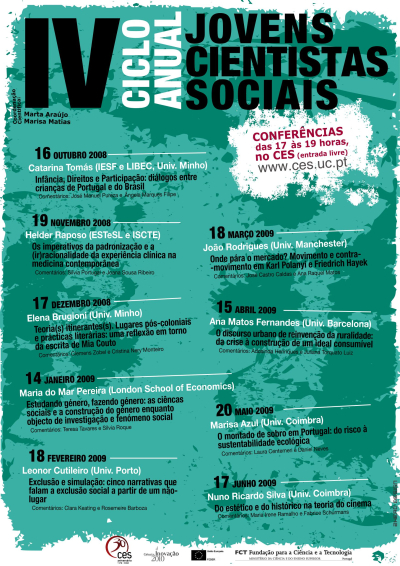IV Annual Cycle Young Social Scientists
2008-2009
May 20th, 17:00, CES Seminar Room
Marisa Azul
The oak grove in Portugal: from risk to ecological sustainability
Abstract: The oak grove in Portugal spreads over 700 000 hectares of forest, mostly associated to agro-forest-pasture exploration. The traditional use of the grove represents an example of success regarding sustainable soil usage in Europe, whilst combining two fundamental aspects of territory management: production and conservation, with social and demographic repercussions. Nonetheless, we have witnessed, over the last two decades, the increase of the decline and sudden death of the oak tree. There are several, complex and yet not totally understood, factors implied in their decline. Deep transformations concerning soil usage in the course of the second half of the 20th century and hydric stress are indicated as two factors intimately associated to the vulnerability of the oak grove. On the other hand, recent modulation studies advise that climate changes constitute an effective risk factor as what pertains to the sustainability of the oak grove in the Mediterranean basin, as they favour the establishing and aggressiveness of pathogenic agents. This state of decline and sudden death of the oak invokes recognizing new biological and ecological parameters, in order to assess the impacts of soil usage, namely agricultural and forest, in the biological diversity, and understand which are the inferences in risk and sustainability of the tree and the entire grove ecosystem. Up to the moment, results suggest that mutualist simbiont organisms of soil(micorrizic fungi), recognized as functional elements of soil, essential for the balance of the ecosystems they are associated to, may be used to diagnose levels of disturbance of the biological diversity, according to the practices of soil usage and the mortality condition of the oak. This study focused on the qualitative and quantitative assessment of micorrizic fungi in several areas in oak grove and counted on the collaboration of the owners that submitted information related to the history of soil usage and management options during the last 25 years. If on one hand, ecological sustainability of the oak is sensitive to environmental factors, which means the future will mandatorily pass through researching the biotic relations simbionts-plants-pathogenics under influence of abiotic factors, in the sense of identifying management options that contribute to soil protection and ecosystem resilience; on the other, it is imperative to recognize that the challenges to the development of strategies towards valorisation, management and sustainability of the oak, are complex and pass inevitably through integrated and multidisciplinary interpretation of the information available through science and technology, economic, demographic and social sciences, and finally, through the availability in collaborating with the land users and in communicating to society the progress of scientific knowledge.
Biographic note: Anabela Marisa Azul, biologist, is researcher at the Centre for Functional Ecology, Department of Botany, University of Coimbra. Within her post-doctoral degree she researches the ecologic role of mutualist organisms of the soil (micorrizic fungi) as indicator of sustainability in agro-forest systems, namely the oak grove. Her work includes close contact with land owners, in order to know the history of soil usage, pursuing biological production and conservation; also the development of environmental education strategies targeted at different audiences, since pre-school age.
